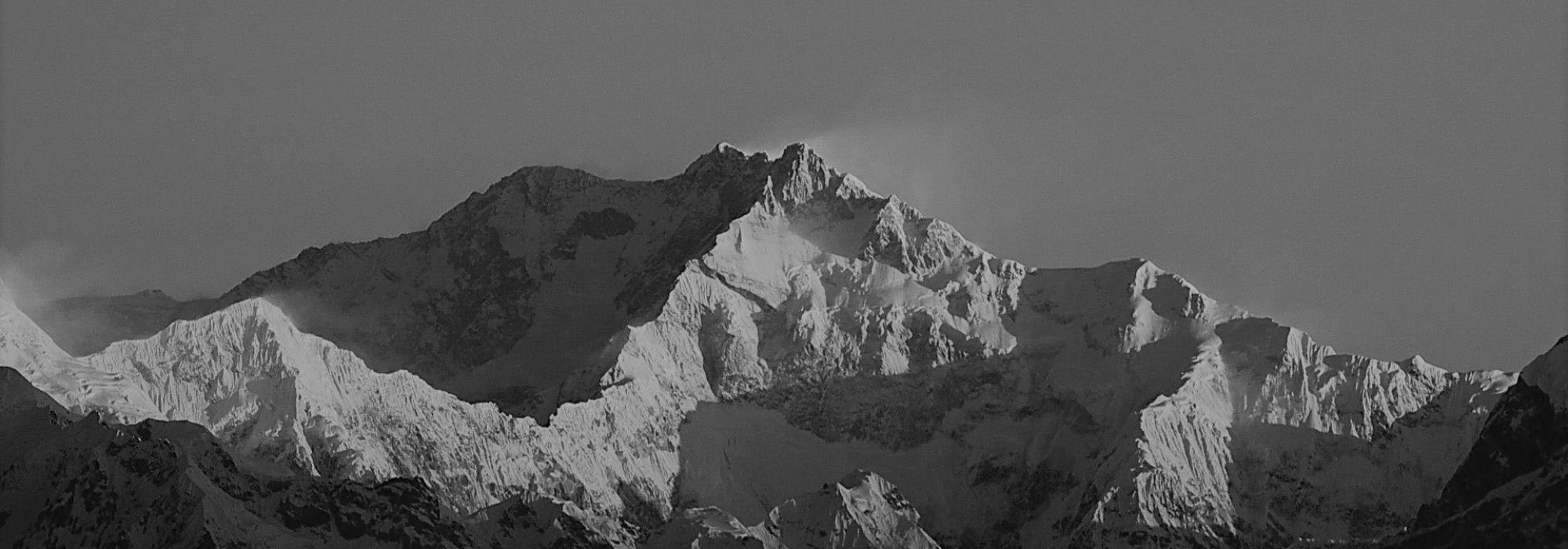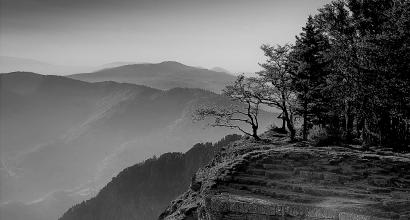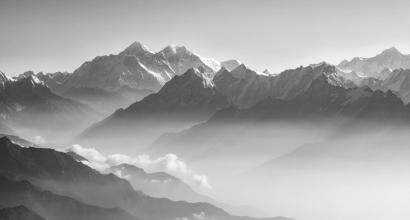A doubt here. "sarvadharmān parityajya" (having given up all dharmas), "māmekaṃ śaraṇaṃ vraja" (surrender unto Bhagavān alone) - is the instruction. Fine. What is the intent behind - “surrender after having given up all dharmas”? Isn’t surrender a dharma too? Or is surrender an adharma? If the verse had "anya-dharmān" (giving up other dharmas) instead of "sarva-dharmān" (giving up all dharmas), this doubt would not have arisen.
Retaining the verse as is, if "sarvadharmān" and "śaraṇaṃ vraja" have to be reconciled, the former has to be interpreted as "leaving all the controversial dharmas of the world aside" and the latter as "take refuge in a a special path, a dharma beyond worldly dharmas, an adhidharma."
jagamirpannaṃ dharmaṃ
jaga ninagiradandu sarvamātmaikamayām ||
“Dharma exists for as long as the world exists.
Once the world ceases to exist for you, the oneness of the Self is all there is.”
Arjuna was not like ordinary men in two aspects. 1. In doubting. 2. In renunciation. In the first aspect, he had more doubts than usual. He repeatedly asked questions in every chapter. He would trust the answer that Bhagavān gave at that instant. But the same trust would disappear when encountering another topic. Doubts and questions again and again. For such a person, śāstric testimony, reasoning, and arguments would not be sufficient. The first help he needed was the strengthening of his faith. He had more trust in his love for Kṛṣṇa than in the śāstras and reasoning. Śrī Kṛṣṇa himself had witnessed this. It was hence the svāmi’s desire to transform Arjuna’s trust that had arisen as an effect of friendship and affection into divine faith. Therefore, he said, "Arjuna, you do not need the various exertions of inquiring into karmayoga, sāṅkhyayoga, dhyānayoga, sannyāsayoga, the dharma of different varṇas, the duty of your clan, the duty of your social station, or worshipping the saguṇa and nirguṇa aspects of Brahma. These confusions will not give you peace of mind. Do you not have faith in me? Do as I ask you. Let things be the way they are. You do not need the hardships of reasoning. Act with faith in me; I will take on the burden of protecting you from harm. Set aside your anxiety about the statements of the śāstras and the actions of society. Your welfare is my responsibility. "māmekaṃ śaraṇaṃ vraja". If devotion in the divine is total and firm, it will satisfy all shortcomings, remove any defects and bring to the devotee all possible well-being. This is above anything else. Therefore it is above all ordinary dharmas and is adhidharma - the crown of all dharmas. It is composed of pure faith and nothing else. It does not require external testimonials or inquiries or reasoning. Śaraṇāgati or surrender is unquestioned and complete faith in Kṛṣṇa. There is no further analysis needed.
anyathā śaraṇaṃ nāsti tvameva śaraṇaṃ mama |
This emotional ecstasy of bhakti has a few levels. Self-surrender or self-dedication is the peak of the edifice of bhakti. It is also known as prapatti (total surrender) or śaraṇāgati.
In such bhakti, notions of "I", "my rights", "my share", "my fate", "my power", or "my will" should be completely erased. The mental mode of "I" should have completely gone. Needless to say, it is quite difficult to ascend to such a state.
A particle of ego always lingers around in our bhakti. We reason - "Bhagavān might bestow his boon on us; he might not too!", "Bhagavān is known to give us what we do not want in addition to what we asked for" - and dilute our bhakti. This is not complete self-surrender. As our bhakti towards Bhagavān is mixed, so too are the boons we receive. Rice mixed with stones might be boiled in milk, but the resultant kheer will continue to have stones in it.
If our happiness has to be complete, the first prerequisite is the effacement of the ego. When we study poetry, we need to lose ourselves in the poet’s creation. This is total immersion. If, however, our sceptical mind pops up every moment with - “let’s see how the poet has written this”, enjoyment of the poem - be it of whatever level - will be incomplete. The same goes for music experience. If we keep watching out for where the singer misses a note, where he stumbles in his pitch or where he misses a beat - even if the quality of singing is worth a rupee, our enjoyment will only be of a paisa’s worth. Such a situation is not right for either the artist or the audience. To experience a work of art completely - be it poetry or music or a sculpture - we must first surrender completely to it by losing our ego.
When ego effacement is necessary for even art experience, is there any doubt in considering it imperative for Brahma-experience?
Numerous examples in the purāṇas - the liberation of Gajendra, the taking away of the Gopis’ garments - emphasise that our self-surrender to Bhagavān has to be complete and not half-hearted. All selfish feelings must be emptied out in the presence of Bhagavān. Not even an iota of bashfulness, arrogance, obstinacy, or pride should be present. Much like a baby lying in its mother’s lap, the bhakta should surrender to Bhagavān; a disciple to his guru; and a reader to the poem - for only then is the gain complete.
Does human agency have no value then? There definitely is value in it during human effort - discernment on how exactly to apply effort and how much energy to expend on it. However, the result is in the domain of daiva. The pinnacle of human effort is in the acceptance of divine will. The apex of human discernment is in giving up anxiety about results.
No great experience is possible for one who does not know how to give oneself up completely. Surrender through unthinking faith is a kind of adhi-dharma that is fit for one racked with doubt.
There is another kind of adhi-dharma that befits one full of jñāna.
As difficult as it was for Arjuna’s intellect to come to a conclusion, renunciation came easily to his mind. Was that not the subject of the entire first chapter? He had no desire for anything then. All his existing desires had dissolved into nothingness. He had nothing to do with any dharma. dharma is needed for the following benefits for its performer:
- To remove sorrow
- To gain pleasure
- To purify oneself
These three benefits do not apply in the least to one who has no feeling of “I” or “me”. Arjuna had said - “na kāṅkṣe vijayaṃ kṛṣṇa”, “kiṃ bhogair-jīvitena vā”. He had no desires. He had no fear other than that of pāpa. For such a person, the befitting instruction is that of the Self in all. A person with such knowledge can act anywhere while experiencing his own Self. At the beginning of the teaching, we see in the second chapter:
trai-guṇya-viṣayā vedā nis-traiguṇyo bhavārjuna |
nirdvandvo nitya-sattva-stho niryoga-kṣema ātmavān ||BG 2.45
“The Vedas are for those who are controlled by the three guṇas. The Vedas are of the form of dhārmic rules and injunctions. Those who are controlled by sattva, rajas and tamas have to perform vaidika activities to rid themselves of the impurity of the guṇa-triad. Arjuna, go beyond the three guṇas. Then, the Vedas and external vaidika activities become unnecessary for you. Go beyond the opposites of worldly life; be an epitome of sattva (good qualities). Give up selfishness and “I”-ness in the form of concern for your well-being. Be established in the Self.”
This indeed is adhi-dharma. General dharma is virtue or good qualities formed through the adherence to external instructions and injunctions of the Vedas and śāstras. Adhi-dharma, however, is virtue or goodness that flows and spreads by itself without any need for external instructions or actions.
“Give up all dharmas and take refuge in me alone.”
Is not this instruction for taking refuge a kind of dharma? Is it adharma? Is not the dharma of surrender one of the dharmas that have to be given up?
Taking refuge in Bhagavān is neither dharma nor adharma. It is beyond both of those; it is adhidharma.
The same actions and behaviours that are considered dharma while being obedient to the dicta of the Veda, become adhidharma when they happen by themselves without the need for any external rules or injunctions.
In the above Gītā verse, we have mām + ekam + śaraṇam + vraja.
Here “mām” refers only to Supreme Brahma. Śrīkṛṣṇa is originally the unmanifest Supreme Brahma; and is Kṛṣṇa only as an incarnation.
brahmaṇo hi pratiṣṭhāhamamṛtasyāvyayasya ca
śāśvatasya ca dharmasya sukhasyaikāntikasya caBG 14.27
To whom should one surrender? “It is to that Parabrahma - whose image is the incarnation of Śrī Kṛṣṇa, the epitome of whose formless consciousness is Bhagavān Kṛṣṇa, who is the abode of all eternal dharma, and who is the origin of supreme bliss that is beyond even a touch of sorrow - that indestructible and changeless Brahma - to which one should surrender”.
To be continued...
The present series is a modern English translation of DVG’s Kendra Sahitya Akademi Award-winning work, Bhagavad-gītā-tātparya or Jīvana-dharma-yoga. The translators wish to express their thanks to Śatāvadhāni R Ganesh for his valuable feedback and to Hari Ravikumar for his astute edits.











































